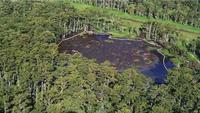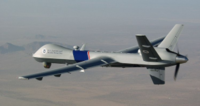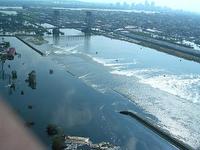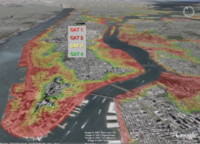-
Experts trying to determine cause of a giant Louisiana sinkhole

The earth near Bayou Corne, Louisiana opened on 2 August: a 300-foot-wide sinkhole, with depth varying between 50 and 300 feet, suddenly opened up in an area, and the authorities have been trying to determine whether the sinkhole was caused by the collapse of an abandoned brine mining cavern along the margin of the Napoleonville Salt Dome or by something else
-
-
How vulnerable is the U.S. to agro-terror attack?

Since the 9/11 terrorist attacks, the United States has spent billions of dollars to make the country safer from another catastrophic event, but little of that money, and little attention, have been directed toward preventing, coping with, and recovering from a terrorist agro-attack; how vulnerable is the United States to an attack on its food system?
-
-
Technology soon to make drones deadlier, more autonomous

Unmanned aerial vehicles (UAVs) have become America’s main weapon in the campaign against terrorists — at the forefront are the Predator and the Reaper — and technological changes would soon make them even deadlier; in the next decade drones will be faster and carry more weapons than today’s versions; they will also have better sensors and more sophisticated computers, allowing them to plan and execute attacks with little human participation
-
-
PKK escalates terror campaign in Turkey
Seven people, including three soldiers, were killed Tuesday in an explosion that struck a military truck as it traveled along a road in Turkey’s southeastern Tunceli province; in the last fourteen months, more than 700 people have been killed in attacks by the PKK on Turkish military and civilians, and in Turkish retaliatory attacks against the Kurdish organization; during the most intense period of the PKK-Turkey conflict, between 1984 and 1999, more than 40,000 Turks were killed in attacks and counterattacks; the key to the surge in PKK terrorism in the last fourteen months: the autonomy the Syrian regime has tacitly given the Kurdish region in northeast Syria, an autonomy which has allowed the PKK the freedom to organize, arm, and launch attacks into Turkey
-
-
Debate over causes of levee failure during Katrina intensifies

A court case in which residents of two sections of New Orleans are suing a construction group has put millions of dollars at stake; residents of the Lower 9th Ward and St. Bernard Parish residents claim that Washington Group International (WGI), an Amy Corps of Engineers contractor, removed several buildings and pilings from land along the Industrial Canal as part of a construction plan to expand the canal’s shipping lock, then failed adequately to plug the holes left behind; the holes allowed rainwater from Hurricane Katrina to seep underneath the 14-foot wall, essentially lifting the wall and allowing the areas to be flooded
-
-
GAO: Easily obtained counterfeit IDs present real risks

The Government Accountability Office (GAO) released a report in which the agency demonstrates that counterfeit documents can still be used easily to obtain valid driver’s licenses and state-issued identification cards under fictitious identities; GAO recommended that DHS exert more assertive leadership in an effort to correct the problem
-
-
Repair bill for Miami-Dade water and sewage system: $12 billion
Repairing, replacing, and rebuilding 13,000 miles of old water and sewage pipes and the treatment plants they connect to could cost Miami-Dade County, Florida more than $12 billion dollars over the next fifteen years; this is a staggering amount – made even more so in light of the fact that this is considerably more than the original estimate of $1 billion
-
-
Georgia’s Plant Vogtle reviving hopes for nuclear power in U.S.
Plant Vogtle, located in Burke County, Georgia, is one of the most watched construction projects in the world; it is currently going through a $14 billion dollar expansion, which includes the first new commercial reactors built in the United States in decades
-
-
Desalination losing ground as a solution to California’s chronic water shortage
According to the July 2011 census, more than thirty-seven million people live in California, increasing the pressure on the state’s water sources; desalinating sea water as a solution to the scarcity of fresh water is not a new technology — it has been around for more than four decades — but it has more recently been considered as a way to address California’s chronic, and growing, water shortage; a closer examination of the technology and its cost has cooled the initial enthusiasm for it
-
-
Obama will use tough language on Iran in today’s UN speech, but no “red lines”
President Barack Obama, in his speech later today to the general assembly of the UN, will use harsher language to denounce Iran for its nuclear weapons program; Obama will also repeat the U.S. commitment to prevent Iran from acquiring nuclear weapons, but will stop short of announcing clear red lines which, if Iran crossed them, would trigger a U.S. military attack on Iran’s nuclear facilities
-
-
West Africa expert still hopes Mali would not devolve into “Africanistan”

Earlier this summer, Islamic militants in the West African nation of Mali destroyed the tombs of Sufi Muslim saints in the fabled city of Timbuktu; the act, widely compared to the Taliban’s destruction of colossal stone Buddhas in Afghanistan, raised concerns about the fate of other cultural treasures in what was once a vibrant center of Islamic scholarship
-
-
Libya gives Islamist militias until Tuesday to disband
Libya president Mohammed el-Megaref on Saturday announced he was giving rogue militia forces in Libya until Tuesday to disband; he said that the Libyan government would address the illegitimate militia problem by using the joint police, the armed forces, and the what he referred to as the “authorized militia brigades”
-
-
Maryland rolls out public safety interoperable communication system
To be better prepared for man-made or natural disasters, Maryland leaders have decided to develop Twelve Core Capacities for Homeland Security, picking the deployment of an interoperable communications system as the highest priority; on 5 June 2012, Governor Martin O’Malley inaugurated the state’s new network, known as the Maryland First Responders Interoperable Radio System Team (Maryland FiRST)
-
-
New York unprepared for flooding, sea level rise

New York City may be a fast paced city of bright lights, sleek attitudes, fashion trends, and some of the best sports teams in the country, but underneath the glitz and glamour is a city which is not prepared for an act of God and which is being threatened by rising sea levels and severe storm flooding; “It’s a million small changes that need to happen,” one expert says
-
-
Twenty dead, scores injured, in violent anti-U.S. demonstrations in Pakistan
Demonstrations across Pakistan this afternoon (local time) have turned deadly, with reports that eighteen people were killed and seventy-eight injured; most of the violence occurred during demonstrations in Karachi and Peshawar; among those killed in Karachi were two police officers; in Peshawar, two police officers were killed; U.S. diplomatic facilities were cordoned off by the police, and the demonstrators instead torched theaters and shops; the Pakistani government deployed a large number of military and security personnel, and cellular phone services in fifteen cities were temporarily blocked to prevent militants from using phones to detonate bombs during the protests; in several cities, military helicopters buzzed overhead
-
More headlines
The long view
What Does Netflix’s Drama “Adolescence” Tell Us About Incels and the Manosphere?
While Netflix’s psychological crime drama ‘Adolescence’ is a work of fiction, its themes offer insight into the very real and troubling rise of the incel and manosphere culture online.
A Shining Star in a Contentious Legacy: Could Marty Makary Be the Saving Grace of a Divisive Presidency?
While much of the Trump administration has sparked controversy, the FDA’s consumer-first reforms may be remembered as its brightest legacy. From AI-driven drug reviews to bans on artificial dyes, the FDA’s agenda resonates with the public in ways few Trump-era policies have.
The Center Can Hold — States’ Rights and Local Privilege in a Climate of Federal Overreach
As American institutions weather the storms of executive disruption, legal ambiguity, and polarized governance, we must reexamine what it means for “the center” to hold.
How to Reverse Nation’s Declining Birth Rate
Health experts urge policies that buoy families: lower living costs, affordable childcare, help for older parents who want more kids
Foundation for U.S. Breakthroughs Feels Shakier to Researchers
With each dollar of its grants, the National Institutes of Health —the world’s largest funder of biomedical research —generates, on average, $2.56 worth of economic activity across all 50 states. NIH grants also support more than 400,000 U.S. jobs, and have been a central force in establishing the country’s dominance in medical research. Waves of funding cuts and grant terminations under the second Trump administration are a threat to the U.S. status as driver of scientific progress, and to the nation’s economy.
The True Cost of Abandoning Science
“We now face a choice: to remain at the vanguard of scientific inquiry through sound investment, or to cede our leadership and watch others answer the big questions that have confounded humanity for millennia —and reap the rewards.”
